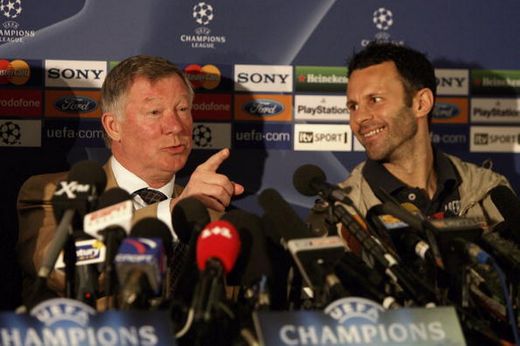News
Sir Alex Ferguson book: 'Ryan Giggs must develop ruthless side to become top manager'

Ryan Giggs has been told to develop a ‘bossy’ side to his character if he is to take the next step in his career and become a manager.
The words of advice for the superstar being tipped to lead Wales and Manchester United one day come from no less a judge than his mentor Sir Alex Ferguson.
Fergie, the man who has overseen the Welsh legend’s stunning 23 years at the top as a player, reckons Giggs has the ability to follow in his own footsteps as a successful manager.
But to do so, Ferguson argues, Giggs does need to introduce a ruthless streak into his character which ensures players never ride roughshod over him in the dressing room.
Ferguson says that is a trait he needed to develop himself in his thirties, one which enabled him to deal with major personality clashes involving David Beckham, Roy Keane and Wayne Rooney at Old Trafford.
“There can only be one boss at Manchester United and that is the manager,” says Ferguson in his new book, which was published last week.
United legends Beckham, Keane and Rooney are amongst those who are given two barrels in the autobiography by outspoken Ferguson
For Giggs, though, there are nothing but plaudits, the Welsh legend being held up throughout as an example to follow for any aspiring footballer.
Unlike Beckham, Ferguson argues, Giggs never coveted fame, shunning the showbiz scene even though he was the individual the corporate world coveted.
His ability to look after himself off the field, thus able to last the test of time as a top player, is also cited by Ferguson as an example for other players.
In terms of talent, Ferguson ranks Giggs ahead of Eric Cantona and second only to Cristiano Ronaldo as the most gifted player he has managed.
No reference is made in the book to approaches made by the FA of Wales for Giggs to become manager of his country.
Giggs was wanted by the FAW when John Toshack left and then following the Gary Speed tragedy. He will also be number one on the FAW list when the Chris Coleman tenure comes to an end.
But Ferguson also reckons Giggs is an ideal candidate to become manager of Manchester United, provided he toughens up as a character.
Ferguson writes: “My hope was that players who had grown up with us would carry things on and maintain the continuity, much as Uli Hoeness and Karl-Heinze Rummenigge, say, had at Bayern Munich.
“They understand how the club functions and the standard of player needed to keep the show rolling. Whether that leads in the end to management cannot be known because it depends on how the coaching side develops.
“But Giggs and Paul Scholes are intelligent men who understand United and were great players themselves, so the right stuff was there.
“Ryan could definitely be a manager because he is so wise and players invariably respect him.
“His quietness would not be a barrier. There are plenty of non-vocal managers.
“But your character must be strong. To deal with a club like Man Utd, your personality has to be bigger than those of the players.
“Or you have to believe it is to control the whole picture. You have big players, rich players, world famous players and you have to rule over them, be on top of them.
“There’s only one boss of Man Utd and that’s the manager. Ryan would need to cultivate that side of himself, but so did I from 32 years of age.”
Perhaps the two most famous players Ferguson had to manage during his time at United were Giggs and Beckham, each meriting coverage in the news and showbiz pages as well as the sports section of newspapers.
But Ferguson reckons the two were like chalk and cheese. He in effect says in the book that Beckham coveted the limelight, whereas Giggs wanted to just let his football do the talking.
Ferguson talks about how disappointed he was to see Beckham regarded as a celebrity, talking of his annoyance at the interest in the ex-England captain’s hairstyle and not his performances on the pitch.
He cites an example ahead of a Premier League clash at Leicester, when Ferguson turned up at United’s Carrington training HQ to find 20 photographers camped outside.
Ferguson was told it was because Beckham was revealing a new hairstyle at the game with Leicester the following day.
Beckham duly arrived wearing a beanie hat and wouldn’t take it off, even during training and a pre-match meal.
Ferguson told him unless he did, he would be dropped from the team for Leicester. Beckham went berserk and unveiled a shaved head which “nobody was to see” until just before kick-off.
“At that time I was starting to despair of him. I could see him being swallowed up by the media or publicity agents,” says Ferguson.
Giggs, by contrast, just wanted to focus on his football and Ferguson can’t talk highly enough of his attitude.
“David was the only player I managed who chose to be famous, who made it his mission to be known outside the game,” writes Ferguson.
“The corporate world wanted to take over Giggsy, but that was never his style.
“The George Best comparison stuck to him immediately and it was impossible to dislodge. Everyone wanted a piece of him. But Giggs was smart.
“‘See the manager’ he would say to anyone wanting a tie-up. He found a way to transfer the blame for a refusal to me. He was clever.
“Giggs turned his back on the fame and branding. He lacked the temperament for that level of exposure.
“His personality was more introverted. To lead that sort of existence you need great energy to be trotting throughout the world and putting your face in front of a camera. It also requires a certain vanity; the belief that this is what you were made for.”
Ferguson says that simply wasn’t Giggs’ style and instead talks of how he shone with his brilliance as a player.
“Ronaldo was the most gifted player I managed,” he says. “The only ones who could be placed near him were Scholes and Giggs because they contributed so prodigiously to Man Utd for two decades.
“That consistency and those behaviour patterns were quite exceptional.”
While Ferguson speaks so highly of Giggs, some of the Welsh wizard’s big-name United peers don’t escape as lightly.
Ferguson lambasts Keane for criticising his team-mates in an interview with the club’s in-house TV station MUTV.
Ferguson says in the interview, which was pulled, Keane “slaughtered” several of the club’s senior players.
Keane then suggested the squad watch the interview and a furious row ensued. Ruud van Nistelrooy, Edwin van der Sar and Fergie’s No.2 Carlos Queiroz argued and Keane then accused Ferguson of bringing his own dispute with shareholder John Magnier over the Rock of Gibraltar racehorse into the club.
“It was frightening to watch. And I’m from Glasgow,” Ferguson says.
“He has the most savage tongue you can imagine.”
Ferguson sold Keane to Celtic immediately afterwards, saying he had to get him out of the club.
Rooney also receives criticism, Ferguson lamenting the striker’s failure to “absorb new ideas or methods quickly” in training and his supposed lack of fitness.
He also reveals more about Rooney’s plea to leave in 2010, when the former Everton man told Ferguson that the club were not ambitious enough.
Rooney said Ferguson should have signed Mesut Ozil, these days at Arsenal.
Ferguson writes in the book: “My reply was that it was none of his business who we should have gone for.”
l Alex Ferguson, My Autobiography is published by Hodder and Stoughton, price £25.


